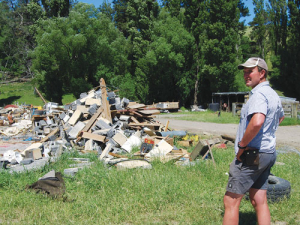Post-quake study reveals hort potential
Large areas of North Canterbury and South Marlborough – affected by the 2016 Kaikoura Earthquakes – offer wide potential for horticulture.
 Highfield Station owner Michael Northcote with the remains of his concrete block workshop levelled by the 7.8-magnitude quake.
Highfield Station owner Michael Northcote with the remains of his concrete block workshop levelled by the 7.8-magnitude quake.
The owner of the historic Highfield Woolshed near Waiau says he will do all he can to save the Historic Places Trust category one-classified landmark.
The large 140-year-old wooden building, brick-red in colour, is visible from the Inland Kaikoura Road, a few kilometres north of Waiau, and is listed as a local tourist attraction. The November 14 earthquake has left it red-stickered -- off its piles – with exterior walls bowed, the floors sloping in various directions and a lean-to roof along the southern side collapsed.
“It was about to go on an Historic Places covenant so they could help us maintain it. We were actually going to re-do some of the piles prior to last week,” owner Michael Northcote told Rural News.
“It’s quite a landmark in Northcote says the shed had been in near-daily use, shearing about 6000 sheep a year.
Northcote’s brother Hugh runs the Whaleback station further up the Inland Kaikoura Road near Mt Lyford. Both farms used to be part of one large property which is why the 24-stand Highfield woolshed is so large. All the sheep from the whole station used to be driven down to Waiau.
“Back in the day when the property – the original Highfield – went from here to the Conway River they could have shorn 60,000+ sheep a year,” says Northcote.
The woolshed has still fared better than a 1940s, unreinforced concrete block workshop about 40m away, which collapsed entirely onto a tractor and other machinery.
It is now a pile of rubble after Northcote and several willing helpers salvaged what they could – tools, a motorbike and “an old farm car” that suffered little more than a broken windscreen.
“The biggest problem is that I’m trying to run a farm now without a functioning woolshed, going into the busy season with shearing and crutching and that,” Northcote says.
“And a workshop... you probably take it for granted when you have it. Where do we do a bit of welding, where do we do any engineering, where do we keep our tools?”
While power is on to the property, Northcote has lost the overhead lines that used to bring power to the working areas, meaning he cannot do various jobs he once took for granted, such as running a compressor to pump up a tyre.
Meanwhile, the homestead is white-stickered although the contents were “absolutely trashed” in the quake.
Water supplies for the house and stock troughs is another huge problem. The property is usually supplied by the local reticulated water scheme, now out of action with an unknown number of breaks to the pipes.
Northcote says because of the drought the property has no natural ponds or springs so is now relying on tankers to top up reservoirs.
But he has nothing but praise for the “fantastic” way the Hurunui District Council, Civil Defence and others responded to the quake.
Tankers from Hawarden and Sefton had come to help local tankers deliver water.
“It’s been a week now and everyone’s still right on the case, ringing up... are we alright? Are we getting stock water? And the answer is ‘yes, we are’. So, I can’t fault that; it’s been brilliant.”
Northcote says he has turned away about 100 people offering to help clean up.
He was alone with his wife Solveig on the night of the quake, but adult sons James and Tom, who both experienced the Christchurch quakes while at boarding school, and now work in Otago and Southland, have returned to help.
Meanwhile, he is trying to run the sheep, beef and deer farm as usual. A stock auction scheduled for November 21 went ahead as planned despite the loss of the woolshed and yards.
The Ministry for the Environment is joining as a national award sponsor in the Ballance Farm Environment Awards (BFEA from next year).
Kiwis are wasting less of their food than they were two years ago, and this has been enough to push New Zealand’s total household food waste bill lower, the 2025 Rabobank KiwiHarvest Food Waste survey has found.
OPINION: Sir Lockwood Smith has clearly and succinctly defined what academic freedom is all about, the boundaries around it and the responsibility that goes with this privilege.
DairyNZ says its plantain programme continues to deliver promising results, with new data confirming that modest levels of plantain in pastures reduce nitrogen leaching, offering farmers a practical, science-backed tool to meet environmental goals.
'Common sense' cuts to government red tape will make it easier for New Zealand to deliver safe food to more markets.
Balclutha farmer Renae Martin remembers the moment she fell in love with cows.

OPINION: For years, the ironically named Dr Mike Joy has used his position at Victoria University to wage an activist-style…
OPINION: A mate of yours truly has had an absolute gutsful of the activist group SAFE.